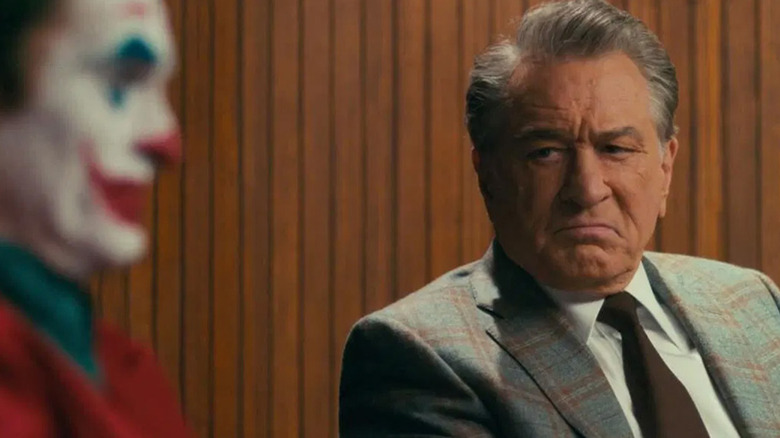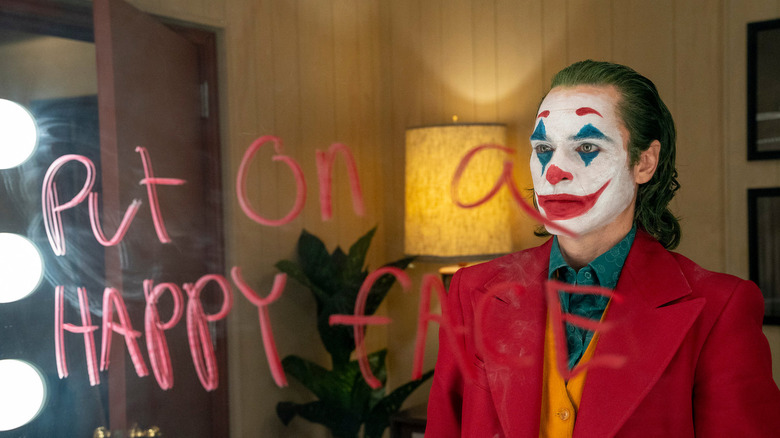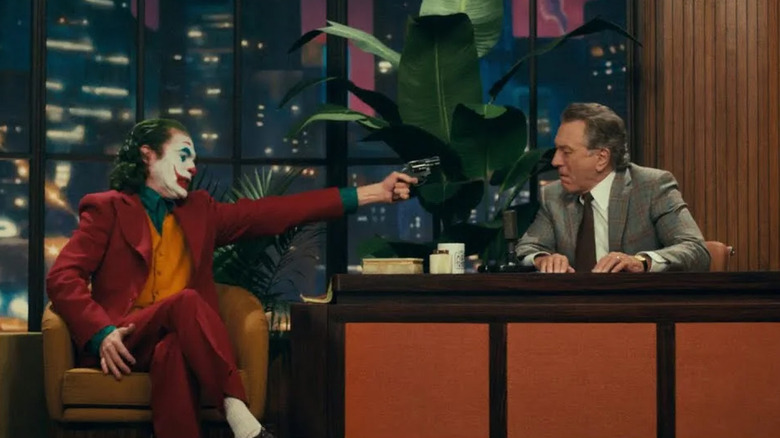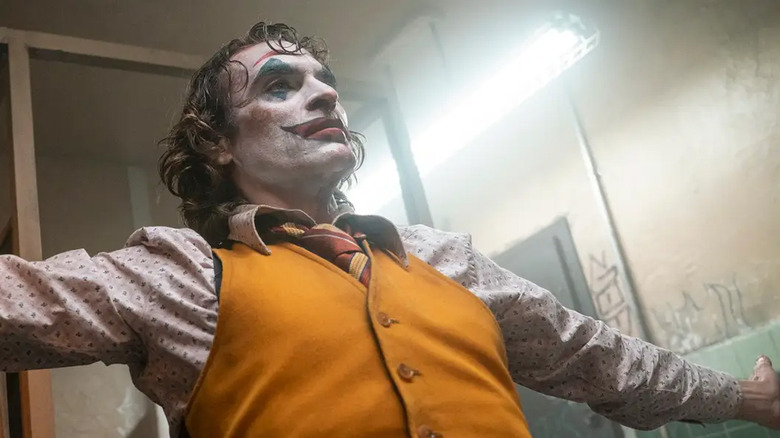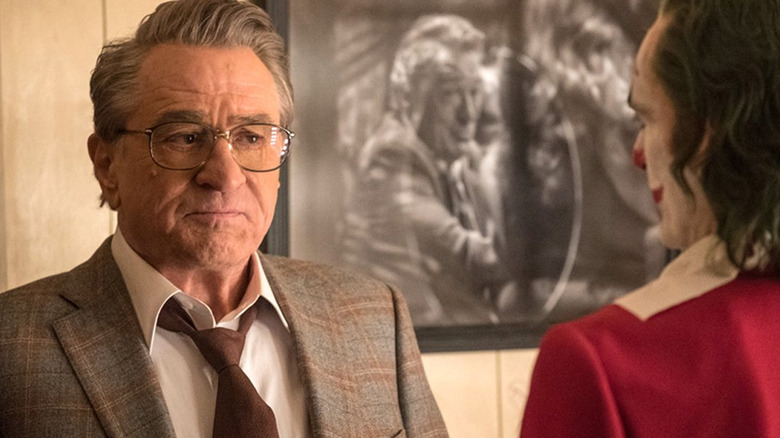Joaquin Phoenix And Robert De Niro Had A Rocky Start Working On Joker
Even before "Joker" was released, it had worked audiences up into a frenzy. Influenced by the likes of "Taxi Driver" and "The King of Comedy," this comic book movie wasn't aspirational. It was instead a gripping, terrifying character study into the fall and plummet of its mentally unstable protagonist, as well as a glimpse at how the legendary Batman villain came to be. And it all hinged on Joaquin Phoenix's performance.
"Joker" tells the story of Arthur Fleck, a mistreated nobody who spends his whole life suffering in a city that ignores him. Sure, his worldview is more than a little disturbing, but do we blame the man, or the society that shaped him? "Is it just me or is it getting crazier out there?" he asks. I think we all know the answer to that.
Although Phoenix's Joker took him to some increasingly dark places, the most hostile were his encounters with late-night host Murray Franklin (Robert De Niro), who plays a key role in Arthur's downfall. You see, Arthur wants to be a stand-up comedian, and after his failed set makes him a viral sensation for all the wrong reasons, Murray tries to exploit Arthur's failure, all in the name of ratings. It's a kick in the teeth for a man who's already at his breaking point. It sounds as though Phoenix and De Niro's relationship was equally tense — at least at first.
'Can you introduce me as Joker?'
It's a sad fact that Arthur Fleck aspires to be like Murray Franklin. "Joker" often presents this via fantasy sequences with Arthur imagining himself cozying up to the late-night talk show host, getting his big break as a comedian, and wowing the audience.
"You see all this, the lights, the show, the audience, I'd give it all up in a heartbeat to have a kid like you," says Murray. But it's just a fantasy. And ironically, Joaquin Phoenix confessed that Robert De Niro was one of his favorite actors, too.
"He is my favorite American actor," he revealed. "I got the impression from him that he did things in [a] scene, certain behaviors, certain gestures or movements, whether the camera was on him and registering it or not."
It's a method of acting Phoenix aspires to himself, creating moments spontaneously on set and capturing that essence in every scene. "For me, I always thought that acting should be like a documentary," Phoenix explained. "That you should just feel whatever it is that you're feeling, what you think the character is going through at that moment."
Unfortunately, it looks as though that wasn't quite what De Niro was used to. Instead, the acting legend was more of a stickler to the script, expecting long and arduous script readings and far more rehearsal than Phoenix was used to.
'I'll tell you what you get... you get what you f****** deserve.'
The two barely spoke to each other on the "Joker" set, as reported in Vanity Fair. The reasoning was that they had very similar acting methods and preferred to relate to each other exactly as their characters would. In this sense, Murray Franklin would likely have shrugged off Arthur Fleck at a moment's notice. "I didn't like to talk to him on set," Joaquin Phoenix said to Vanity Fair. "The first day we said good morning, and beyond that, I don't know that we talked much."
It was the same for Robert De Niro, who preferred a more hands-off approach when dealing with his costar. "His character and my character, we didn't need to talk about anything," explained De Niro. "We just say, 'Do the work. Relate as the characters to each other.' It makes it simpler, and we don't [talk]. There's no reason to."
Of course, that must have made things tense on set. After all, Arthur and Murray may not exactly be best buddies, but they share a lot of screen time, especially when you take Arthur's delusions into account. Unfortunately, things were even worse when it came to their methods, with the actors clashing about the nature of their rehearsals. And it all comes down to their scripts.
'You wouldn't get it.'
It's no secret that Joaquin Phoenix is renowned for his ability to truly commit to any role. And in "Joker," that meant embodying the maniacal Arthur Fleck by deeply immersing himself in the character.
"He has a limitless ability to surprise you in the best ways," said "Two Lovers" director James Gray. "[He inspires] you to move in a direction that you haven't thought of originally, better than what you have in mind, and expands the idea. He's extremely inventive." For Phoenix, it's all about understanding the character and embodying them on set, giving way to a more spontaneous approach that's rooted in the character he plays.
However, Robert De Niro takes a more by-the-book approach, beginning with a script read-through, a practice he considers to be standard. But Phoenix wasn't interested. As director Todd Phillips recalled to Vanity Fair:
"Bob called me, and he goes, 'Tell him he's an actor and he's got to be there, I like to hear the whole movie, and we're going to all get in a room and just read it.' And I'm in between a rock and a hard place because Joaquin's like, 'There's no f****** way I'm doing a read-through,' and Bob's like, 'I do read-throughs before we shoot, that's what we do.'"
Ultimately, Phoenix relented and agreed to a script read-through at De Niro's offices in Manhattan. But it didn't exactly go well. Phoenix apparently "mumbled" his way through the script and then went off for a smoke in the corner of the room. De Niro invited him to his office for a chat, but Phoenix refused. Phillips continued to Vanity Fair: "He's in front of Bob, and he goes, 'I can't, I gotta go home,' because he felt sick after that read-through, he didn't like it."
Thankfully, the two soon came to an understanding.
'You don't listen, do you?'
After the uncomfortable exchange, Todd Phillips urged Joaquin Phoenix to meet with Robert De Niro. After all, the two would be working closely in an arrangement that saw De Niro's character become almost like a muse to Phoenix's Joker. Eventually, Phoenix reluctantly agreed.
According to Phillips, the pair talked through some minor issues. At one point De Niro turned to Phoenix, took his face in his hands, and kissed him on the cheek. "It's going to be okay, bubbeleh," he said.
Presumably, their exchange helped them get over their strange rift, as the chemistry between Phoenix and De Niro in those final scenes is absolutely electric. Or perhaps the friction they each felt for each other helped fuel the fiery scenes as Arthur confronts Murray live on TV — and ultimately kills him.
Although Phoenix can be quite intense and charged up on camera, it's said that behind the scenes, he's a different person altogether. "He's actually very tender and sweet and sensitive," director James Gray told Esquire. "It's almost as if he channels his intensity into the characters. Like the work is an outlet for his darker side."
De Niro certainly got to see Phoenix's darker side through his "Joker" role, but it sounds as though the two managed to put aside their differences once the cameras stopped rolling. The result is an electrifying conclusion to one of comic book history's most intense movies.
